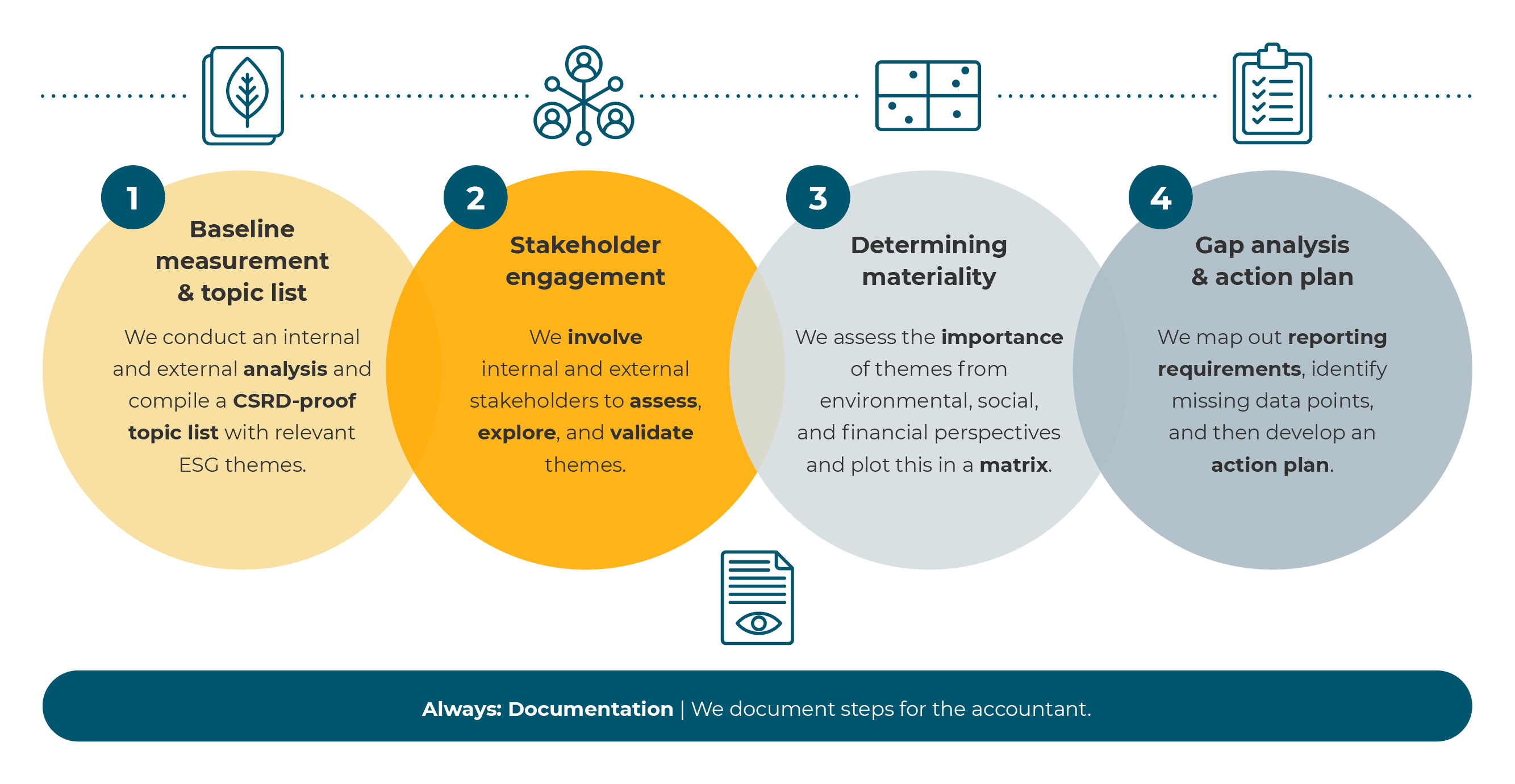At a time when sustainability is the norm and the demand for transparent reporting is growing, ESG disclosure is central to demonstrating your company’s impact on the environment, society and governance. With the European Union now firmly committed, more and more C-level executives and decision-makers are seeking clear, forward-looking reporting. We are determined to meet this challenge head on. By taking a fresh approach with clear, focused reporting.
What is ESG disclosure?
ESG disclosure involves mapping out the impact of your company on the environment (Environment), society (Social) and the governance of the organisation (Governance). This includes, for example, carbon emissions and anti-corruption efforts. It is a way of providing transparency about the company’s impact on society. And the demand for transparent reporting is growing. The European Union is strongly committed to including non-financial information in annual reports, with the Corporate Sustainability Reporting Directive (CSRD) leading the way for listed and large companies (a company scoring 2 out of 3 of the following criteria: more than €50 million turnover, more than €25 million in total on their balance sheet, more than 250 employees).
-
What the CSRD requires
The CSRD requires more comprehensive reporting of non-financial information, including strategy, policies, targets, KPIs and action plans. In our approach, we base this reporting on a dual materiality analysis, which assesses a company’s impact on people, the environment and society, as well as the financial impact of sustainability issues on a company.
This is how we do it
We take you through the theory behind ESG disclosure. But without the complexity of sustainability jargon – we make it understandable for your organisation. And practical. We are always up to date with the latest reporting standards and legislation, including the CSRD, the Taxonomy and the GHG Protocol. And with our extensive assurance experience, we speak the language of the accountant. By doing this, we maintain a healthy balance between reporting obligations and ensuring the effective continuity of actions undertaken. And this is how we go about it.

Your own action plan in four steps
1. Baseline measurement & topic list
We conduct thorough internal analysis: strategic documents, stakeholder dialogues and previous materiality analyses. At the same time, we analyse external factors, including developments among customers, competitors and within the industry. This is the baseline measurement. We present the findings in a preliminary, CSRD-proof topic list of ESG subjects. We adjust and validate this list to ensure it covers the most relevant and impactful topics.
2. Stakeholder engagement
Stakeholder engagement is critical to the sustainability process. We use stakeholder mapping to ensure that the right stakeholders are identified and engaged in the right way. We conduct interviews with representative groups of internal and external stakeholders in order to test these issues and identify them.
We will use the resulting insights to confirm the preliminary topic list from step 1. If necessary, a survey of a wider group of stakeholders may be considered to further support and refine findings.
3. Determining materiality
Throughout several workshops, we analyse the environmental, social and financial impact of business activities, identifying both positive and negative effects. We then assess the importance of these effects and place them in a materiality matrix. This provides insight into the most significant areas requiring attention. We present the results of this materiality assessment to key internal stakeholders for validation. Finally, we communicate the results with the management team to agree on the priorities and action points identified.
4. Gap analysis & action plan
We identify relevant reporting requirements and conduct a gap analysis based on available documentation. In this way, we also identify missing data points. Based on these insights, we draw up a concrete action plan together, ensuring sustainable impact in both the short and long term. We therefore support not only with an ‘easy to understand’ ESG report, but also with a ‘targeted’ one. So that, as an organisation, you not only ‘comply with’ but also ‘excel in’ the current standards of sustainable reporting.
Always on: Documentation
Throughout the process, we document all the steps in a clear wayfor the accountant.
Get started with your own team
We firmly believe in teamwork. We tailor our strategic long-term projects to the needs of your business or organisation. We form a dedicated team of three to six experts, diverse and resilient. They work together to guide your organisation from development through to implementation. In this way, we ensure the quality and continuity of your sustainability initiatives. Want to make an impact together?
Book an introductory meeting Download our brochure
A preview of our experts
Meet two of our experts who, together with a dedicated team of fellow experts, contribute to the long-term success of our clients.



